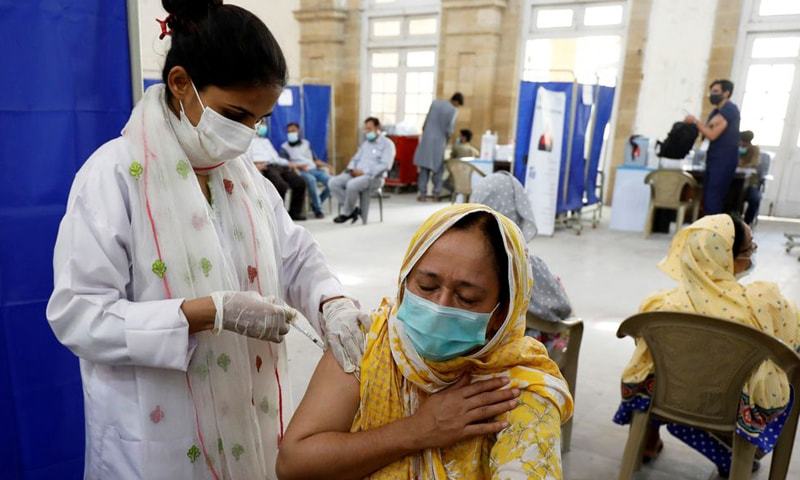For almost a month, Pakistan’s daily COVID-19 caseload has largely remained in the 3,000-4,000 range as the country fights the pandemic’s fourth wave.
In terms of fatalities, the daily toll has been consistent at about 100 for more than a week.
After 60,537 tests and 83 fatalities, the country’s National Command and Operation Centre confirmed 3,902 COVID-19 infections on Wednesday.
The additional cases brought the overall number of confirmed cases to 1,190,136, and the number of fatalities to 26,413, according to NCOC statistics.
The positivity rate now stands at 6.44 percent. On 14 of the 16 days since August 24, Pakistan’s positivity rate has been below 7%.
So far, 1,071,976 individuals have recovered from the virus, while the number of active cases in the country has decreased to 91,747.
For the second week in a row, Pakistan’s COVID-19 positivity rate has remained below 7%.
Pakistan is reporting 3,730 new infections per day on average, which is 64% more than the peak – the highest daily average since June 17.
So far, the country has sent out at least 63,319,214 doses of COVID vaccines. Assuming that each individual requires two doses, it would be enough to vaccinate 14.6 percent of the country’s population.
Pakistan gave an average of 1,216,860 dosages per day over the latest week reported. At this pace, administering enough dosages for another 10% of the population will take another 36 days.
From October 1, the Civil Aviation Authority (CAA) has published a new advisory requiring a COVID-19 vaccination certificate for air travel.
After September 30, international and domestic travel without the COVID-19 vaccine will be prohibited, according to the new regulations.
Those under the age of 17 and patients are not required to show a vaccination certificate. Patients, on the other hand, must provide a doctor’s letter in order to get an exemption.
The aviation authority had already extended the limitations on incoming aircraft until September 30, while maintaining the ban on countries classified as Category C.
The notice said that any Pakistanis whose return to Pakistan from Category C countries is planned for September 30 may travel to the country without a specific exemption.
The CAA issued a notice on August 30 requesting the COVID-19 limitations to be extended.
They must also have a negative PCR test result obtained within 72 hours of beginning travel to Pakistan, according to the statement.
The CAA previously said that all incoming travelers aged six and above would be required to have a valid negative PCR test result obtained within 72 hours of the start of the journey to Pakistan.
“All arriving passengers of age 6 years and above will be tested through rapid antigen testing upon arrival in Pakistan,” the travel advisory had said.
Testing results that are positive Passengers aged six to twelve would be quarantined at home under the supervision of relevant authorities, according to the announcement.
Positive-testing travelers above the age of 12 will be quarantined at a designated facility, according to standard practice, according to the travel warning.
Due to the volatile nature of the COVID-19 situation, any or all incoming passengers may be subjected to extra restrictions required by the appropriate health authorities upon arrival in Pakistan,” the advisory said.









